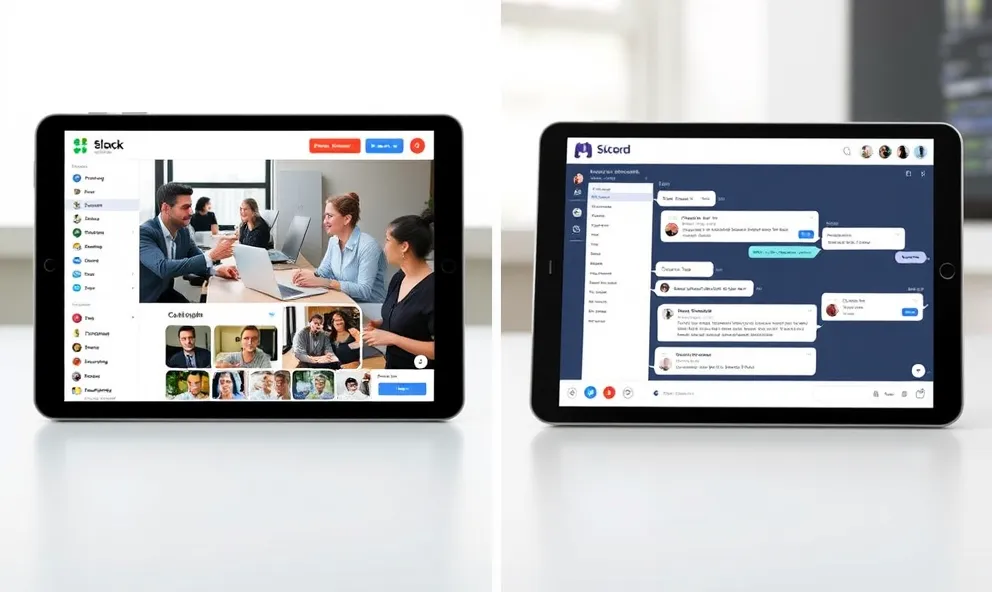In today’s fast-paced world, communication tools have become essential for businesses, teams, and organizations to stay connected and organized. Among the most popular communication platforms, Slack and Discord stand out. While both are designed to facilitate group chats and collaboration, they serve different purposes and are often used by different types of teams.
If you’re wondering which tool is better suited for your business, you’re not alone. This blog will help you understand the difference between Slack and Discord, and which platform is best for your business. We’ll dive into their features, pros, and cons to give you a clear idea of Slack vs Discord for business.
Table of Contents
What is Slack?
Slack is a business-oriented collaboration tool that was specifically designed for workplace communication. Launched in 2013, Slack is widely used by teams and businesses to streamline communication. It provides messaging features, file sharing, task management, and integration with other business tools like Google Drive, Asana, and Trello. Slack is built with professionals in mind, offering an easy-to-navigate interface and functionality that makes it a powerful tool for project management and team coordination.
What is Discord?
Discord, originally created in 2015 for gamers, has evolved into a versatile communication platform. It provides voice, video, and text chat features and is used by communities, hobbyists, and even businesses for both casual and formal communication. Initially popular for gaming communities, Discord has expanded its reach and is now widely used by various groups for communication, collaboration, and socializing. Discord focuses on providing an interactive experience with features like voice channels, live streaming, and bots that make it unique.
Also Check: Slack Vs Teams
Slack vs Discord for Business: Key Differences
Though Slack and Discord may seem similar at first glance, they differ in several key areas that determine which one is more suitable for your business needs. Let’s break down the difference between Slack and Discord based on various aspects:
1. Purpose and Use Case
- Slack was built from the ground up for business communication. Its primary goal is to help teams collaborate efficiently through organized channels, direct messaging, and integrations with other work tools. It’s designed to keep professional conversations focused and streamlined.
- Discord, on the other hand, was originally created to provide voice and text chat for gaming communities. While it’s now used by a wider range of users, including businesses, Discord maintains a more informal, community-driven approach. It’s perfect for groups that need a more casual and interactive space for communication.
2. User Interface and Experience
- When it comes to a clean, professional, and organized interface, Slack helps businesses focus on work. The sidebar shows channels, direct messages, and integrations, while messages are categorized into threads, keeping discussions organized. Slack also offers a range of customization options to fit the branding and needs of the business.
- Discord, however, has a more casual interface, designed to accommodate gaming communities. Channels are organized into servers, and users can join different “voice channels” for live conversations. While Discord has improved its interface for business use, it still carries a more laid-back and informal vibe.
3. Channels and Organization
- Slack takes organization seriously with its channel-based structure. Teams can create different channels based on projects, departments, or topics. It’s easy to manage, search, and organize messages, keeping the focus on productivity. For businesses, Slack’s structure is very efficient in maintaining organized communication, as everything is separated into different workspaces.
- Discord also uses channels but takes a different approach. Channels are organized into servers, which act like individual hubs for different teams, interests, or activities. Discord allows both text and voice channels within a server. While this is great for casual users, it may not be as effective for businesses that require a more formal and structured approach to communication.
4. Voice and Video Communication
- Slack offers voice and video calls, but its functionality is more suited for professional meetings or one-on-one calls. Slack’s calls are perfect for businesses, offering screen sharing, call recording (with integrations), and integration with other business tools like Zoom.
- Discord shines in this area, as it provides excellent voice chat capabilities, especially in group settings. Users can easily hop into a voice channel, where they can chat with others in real-time. Discord also supports high-quality video and voice chats, which is perfect for communities or teams that need more spontaneous, ongoing conversations. However, while its voice chat is great for collaboration, it is generally more relaxed and not ideal for formal business meetings.
5. Integrations with Other Tools
- Slack has a wide range of integrations that are critical for business. It integrates with Google Drive, Dropbox, Trello, Asana, GitHub, and many more tools to streamline workflows. Slack also supports advanced automation, making it a fantastic choice for businesses that rely on third-party applications to manage their processes.
- Discord, while offering some integrations, is not as focused on work tools. It does integrate with some apps (like Twitch and Spotify), but it does not have the robust integration options that Slack provides for business tools. For businesses that rely heavily on integration, Slack will likely be the better option.
6. Pricing
- Slack offers a free version, but it comes with limited message history, file storage, and integrations. The paid plans (Standard, Plus, and Enterprise Grid) are designed for businesses that need more functionality, such as unlimited message history, advanced security, and admin features.
- Discord is free to use, and it offers a premium version called Discord Nitro, which provides additional features such as higher-quality video, custom emojis, and larger file uploads. The free version of Discord is highly functional, with no limits on the number of messages or channels.
7. Security and Compliance
- Slack is built with businesses in mind, so it includes robust security features such as two-factor authentication, enterprise-grade encryption, and compliance with industry standards like HIPAA and GDPR. These security features make Slack ideal for businesses that handle sensitive data.
- Discord provides basic security options like two-factor authentication, but it lacks the advanced compliance and security features that Slack offers. For businesses handling sensitive information, Slack is the safer bet.
8. Community Features
- Slack is all about teamwork, focusing on collaboration within a defined business context. It’s ideal for small and large businesses that need to stay organized and communicate effectively within departments, projects, or teams.
- Discord is designed with community engagement in mind. It’s perfect for teams that thrive on informal communication and are looking for a platform that fosters strong relationships. The ability to create voice channels and engage in real-time discussions makes Discord an excellent choice for teams that require constant interaction.
Read More: Janitor AI Alternatives
Which Is Better for Your Business?
When it comes to Slack vs Discord for business, the decision ultimately depends on your business needs.
- If you are a large organization or a company that needs structured communication, integrations with work tools, and a professional environment, Slack is the ideal choice. It offers better organization, security, and a more business-focused approach to collaboration.
- If you run a smaller team, a community-driven business, or an industry that values informal, spontaneous communication (like gaming, creative teams, or tech startups), Discord might be a better fit. It’s free, flexible, and excellent for real-time interaction, but it may not be as well-suited for companies that require advanced tools for project management or security.
Conclusion: Slack vs Discord (The Final Verdict)
In summary, both Slack and Discord offer valuable features, but they cater to different needs. Slack is the best choice for businesses that require a more structured, professional communication platform with powerful integrations and security features. Discord, on the other hand, works well for smaller teams, creative businesses, or communities that value flexibility, voice communication, and informal interactions. Consider your team’s size, work culture, and specific communication needs before making a decision. Whether you choose Slack vs Discord for business, both tools provide strong communication options to help your team stay connected and productive!




